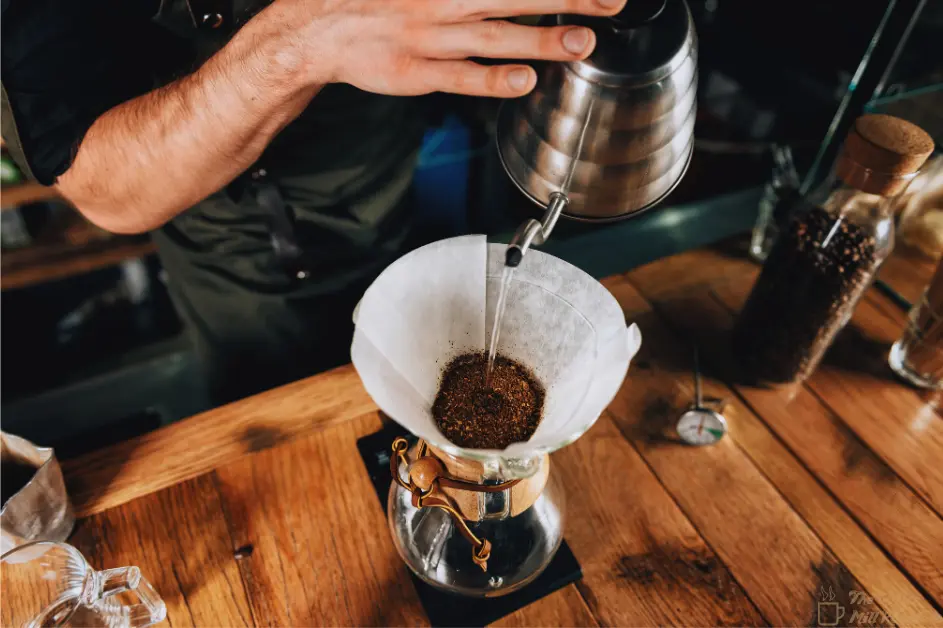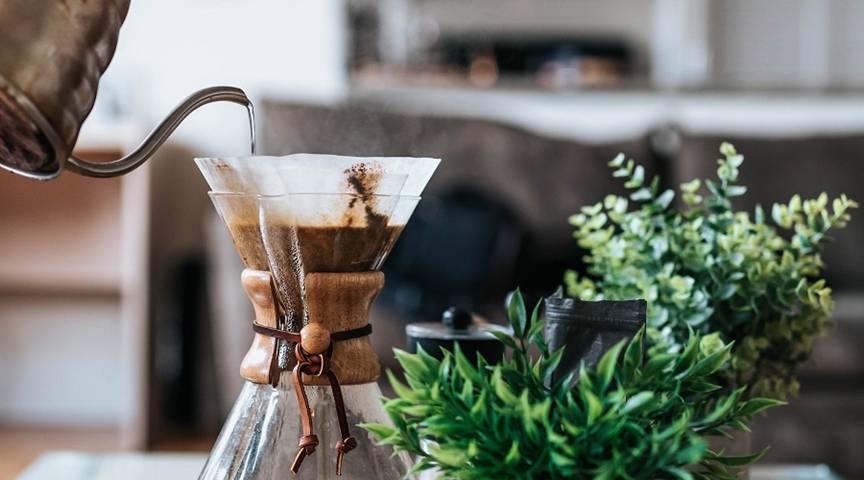Pour-over coffee brewing is becoming popular because of its easy-making procedure. The brewing technique lets you get the rich flavor of coffee with minimal effort. You have probably noticed that pour-over coffee filters are available in brown and white colors. So, a common question among beginners is – which one is better between brown vs. white coffee filters?
We found that both filters have no difference except in the manufacturing process. The color of a coffee filter depends on whether it is bleached or unbleached.
Please read the entire post to learn more about brown and white coffee filters.
- A Brief History of Coffee Filters Invention
- Brown vs. White Coffee Filter: What Is the Difference?
- Which One Is Better, White or Brown Coffee Filters?
- Are Paper Coffee Filters Healthier?
- Which Coffee Filter Is More Environment-Friendly?
- Are Brown Paper Filters Better Than White Paper Filters?
- Are White Coffee Filters Unhealthy?
- Does the Color of Coffee Filters Matter?
- Can the Color Difference Affect the Taste of Coffee?
- #2 and #4 Cone Coffee Filters: What is the Difference?
- Final Verdict
A Brief History of Coffee Filters Invention

An interesting fact about the pour-over coffee filter is that it was invented accidentally by a German housewife in 1908. Melitta Bentz, the inventor of coffee filters, always wanted to achieve the best flavor of coffee. Once, she made a cone with blotting paper, filled it with ground coffee, and poured steaming water through it. Finally, she got the expected taste of coffee.
Melitta Bentz patented her revolutionary invention and started her coffee filter company called Melitta. The company is still producing high-quality and cost-effective coffee drippers.
Brown vs. White Coffee Filter: What Is the Difference?
The manufacturing material of brown coffee filters is unbleached papers. They go through less processing and retain the organic papery color and smell. That’s why you may experience a little papery taste in coffee. However, brown filters are entirely safe for our health and the environment.
Contrariwise, white coffee filters are bleached and go through several chemical processes. They look clean white and contain no outer smell. Most people prefer white filters since they don’t alter coffee’s taste. However, excessive use of white filters can be harmful to the environment.
Which One Is Better, White or Brown Coffee Filters?
In the case of white and brown coffee filters, no one is better than the other. Both of them are made of similar grade papers. Coffee filter brands also maintain the same manufacturing standard for both products.
So, the color difference will not immensely change the taste of coffee. You cannot prioritize white over brown and vice versa since they produce the same coffee.
Are Paper Coffee Filters Healthier?
According to a European Journal of Preventive Cardiology study, paper filters are healthier among other alternatives. The study also shows that filtering is the healthiest way to brew coffee. Paper filters remove unhealthy coffee substances that may lead to increased blood cholesterol.
Which Coffee Filter Is More Environment-Friendly?
Any biodegradable coffee filters are better for the environment. Based on the theory, paper coffee filters are safer because they decompose over time. However, brown coffee filters will break down faster than white filters since they are unbleached and contain organic features.
Are Brown Paper Filters Better Than White Paper Filters?
Brown filters will brew the same coffee as white filters. So, you cannot compare them in the case of brewing quality. Both are equally fine for excellent drip brewing. However, brown coffee filters are good for the environment due to their organic characteristics.
Read: Hario V60 Ceramic vs Plastic Dripper
Are White Coffee Filters Unhealthy?

In short, white coffee filters are safe to use. They are also good for preventing papery taste from the coffee. It is known to all that white coffee filters are bleached. Bleach is usually irritative to our skin. So, many users might be concerned if white coffee filters are healthy. The truth is that the amount of bleach used in filters is insufficient to leach into the coffee.
Does the Color of Coffee Filters Matter?
In a word, the color of coffee filters is not a big deal. The buying decision mostly depends on the user’s preference. Brown filters look more natural, whereas white filters look cleaner – that’s it. For the authentic flavor of coffee, users mostly choose white filters over brown.
Read: Square vs. Circle Coffee Filters : The Difference
Can the Color Difference Affect the Taste of Coffee?
You may notice a little papery taste in coffee while using brown coffee filters. It contains the organic smell of paper because of the natural manufacturing process. As a result, the smell can mix with brewed coffee. White coffee filters will never alter the taste since they are bleached and free from outer smells.
#2 and #4 Cone Coffee Filters: What is the Difference?
These numbers on coffee filters specify their compatibility with a coffee dripper. If you use a Chemex or Hario V60, the #2 coffee filter is suitable for a dripper with a 4-6 cups capacity. Similarly, the #4 will suit an 8-12 cups dripper.
Final Verdict
According to facts, there is no best one between brown vs. white coffee filters. However, most prefer white filters since they produce clear and aromatic coffee.
Brown filters, on the other hand, can leach a papery taste into the coffee. It is a common case when using unbleached coffee filters. You can also eliminate the outer smell by rinsing them before brewing.
References:
https://www.reddit.com/r/Coffee/comments/43co37/is_there_actually_a_difference_in_use_between/
https://www.reddit.com/r/Coffee/comments/16bx3c/what_is_the_difference_between_bleached_and/